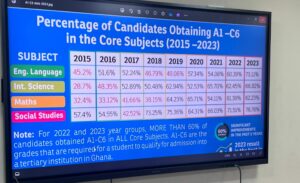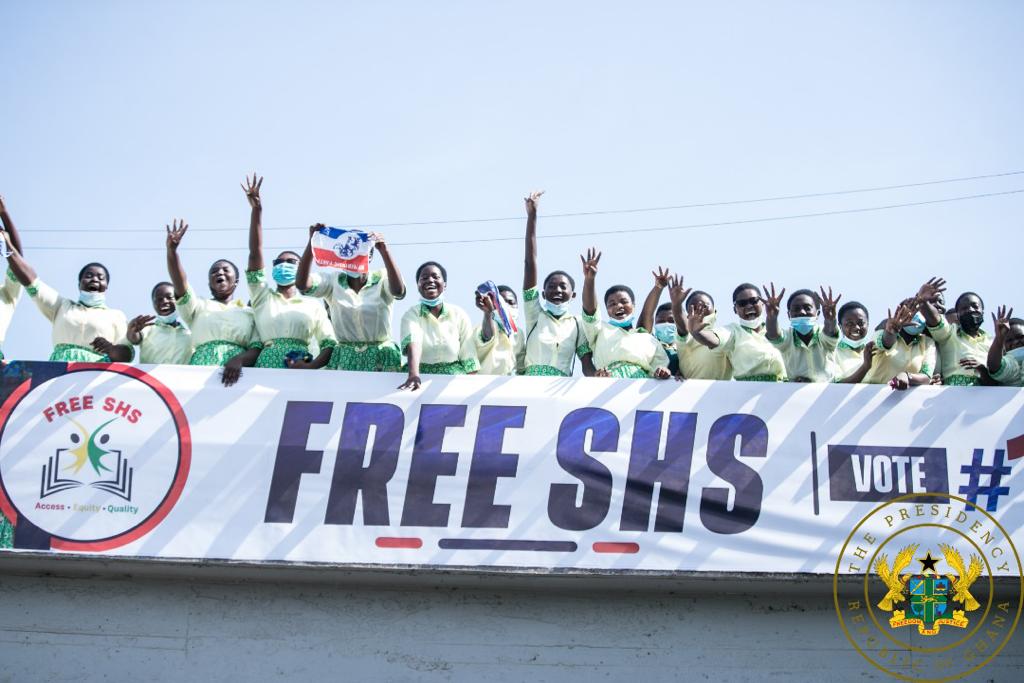adverts
A heated debate has erupted at the University of Ghana after Professor Oteng Ababio’s harsh critique of the Free Senior High School (SHS) policy, with some lecturers branding his comments as politically motivated and misleading.
Prof. Ababio claimed that 83.2% of Free SHS graduates at the university, despite receiving top grades, struggle to solve basic algebra problems, suggesting the policy prioritises quantity over quality.
However, his comments have sparked outrage from colleagues like Dr. Joshua Jebuntie Zaato, who described the remarks as a deliberate attempt to undermine a successful educational initiative for political purposes.
adverts
Dr. Zaato, a senior lecturer in political science, dismissed Prof. Ababio’s statements as politically charged rhetoric intended to score points for the opposition National Democratic Congress (NDC).
Speaking in an interview with Puretvonline.com, Dr. Zaato questioned Prof. Ababio’s motives, suggesting that his attack on Free SHS lacked academic rigour and was designed to create a negative public perception of the policy. He emphasised that the success stories of Free SHS graduates, including international scholars and award-winning students, completely contradict Ababio’s claims.
“The notion that Free SHS students are academically incapable is not only false but also a disservice to the many bright minds who have excelled under this policy,” Dr. Zaato stated. “If a few students struggle with algebra, it does not mean the entire system is broken. Prof. Ababio is cherry-picking data to push a narrative that suits his political agenda.”
Dr. Zaato cited the example of Thomas Amoani, a Free SHS graduate who went on to earn First Class Honours at Brunel University, and Tyrone Marhguy, the young Rastafarian student who recently secured a full scholarship to the University of Pennsylvania. “Are these achievements fake?” Zaato challenged. “Is WAEC cooking its results to support the government? Prof. Ababio needs to answer these questions if he wants to be taken seriously.”
He further accused Prof. Ababio of making sweeping generalisations about student performance without considering the broader context of educational access. “The purpose of Free SHS is to ensure that no Ghanaian child is left behind due to financial constraints. The policy has succeeded in increasing enrolment and giving millions of children a chance at education. Ababio conveniently ignores this and focusses on isolated cases of academic struggle.”
In a scathing critique, Dr. Zaato suggested that Prof. Ababio’s comments were not made in good faith, pointing out that they were delivered in a political setting rather than an academic conference. “If this were an academic discussion, he would be asked to provide credible data and evidence to support his claims. But this was clearly a political platform, designed to tarnish the image of a policy that has transformed the lives of millions.”
Backing Dr. Zaato’s stance, Professor Edward Benjamin Sabi, a senior lecture of Agriculture Engineering also condemned Ababio’s critique, accusing him of siding with the NDC to discredit Free SHS for political gain.
“It is shocking that a professor would make such baseless claims without providing any source or data to back them. The fact that he didn’t even bother to cite any academic studies or research shows this is a politically motivated attack,” Prof. Sabi remarked.
He then again stated that not all the lectures in the university are sympathisers of NDC.
Prof. Sabi criticised Ababio for downplaying the immense societal benefits of the Free SHS program. “Instead of acknowledging the millions of children who have been saved from the streets and given a chance to pursue education, Prof. Ababio is focussing on a handful of students struggling with algebra. This is not an honest assessment of the policy; it’s a politically driven attack.”
He further challenged Ababio’s claims that the policy compromises quality. “Yes, there are challenges, but the government is addressing them. Are we to say that because a few students are underperforming, we should abandon a policy that has given so many children hope? This is a ridiculous notion.”
Since its implementation in 2017, the Free SHS program has benefitted over 5.7 million students, drastically increasing enrolment in secondary schools. While critics like Prof. Ababio point to issues of quality, advocates argue that the policy’s impact on educational access far outweighs its challenges.
Dr. Zaato, in his final remarks, issued a sharp rebuke to his colleague: “If Prof. Ababio wants to play politics, he should do so without dragging the future of millions of students into his agenda. His statements are misleading, divisive, and unfair to the countless young minds who have benefitted from this revolutionary policy.”
The battle over Free SHS continues to rage, but what is clear is that the policy remains a lifeline for many Ghanaians. Critics like Prof. Ababio may try to discredit it, but for the millions of students and families it has helped, Free SHS is nothing short of a game-changer.
Watch below the recent statistics of WAEC on free SHS students:



